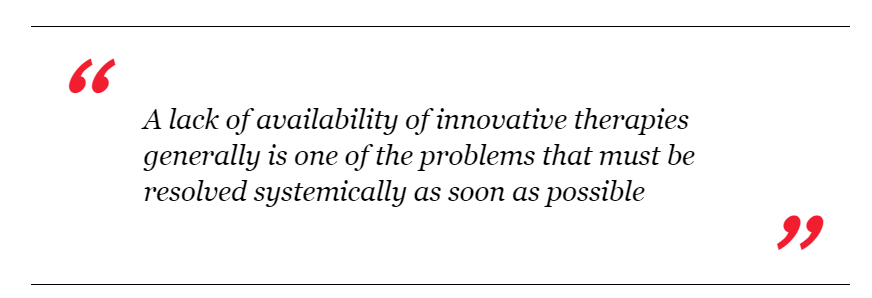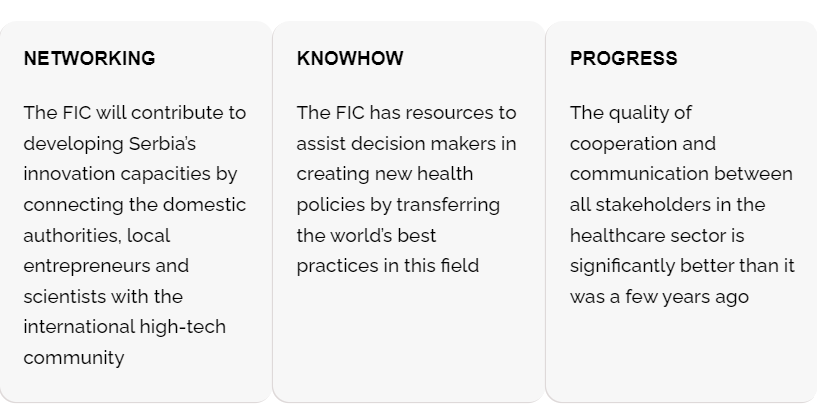ANA GOVEDARICA, FIC VICE PRESIDENT AND SPOKESPERSON AND ROCHE GENERAL MANAGER
Through Dialogue to New Legal Solutions

The inclusion of relevant experts and interest groups in the process of adopting legal regulations is important to overcoming the challenges posed by the implementation of new legislative solutions, as it reduces the risk of inconsistencies and conflicts.
During the previous period, between the publishing of two editions of the White Book, the FIC provided a significant contribution to improving the Law on Foreigners, the Law on the Employment of Foreigners and the Law on Planning and Construction, while we also initiated – together with 12 other business associations – recommendations aimed at improving regulations in the field of renewable energy sources. Moreover, with an awareness of the importance of reporting on environmental protection, social issues and corporate governance (Environmental, Social, and Governance Reporting), we launched discussions on many issues, such as regenerative agriculture and non-financial reporting, while we also recognised the essential need to resolve the problem of waste management and many other problems ~ says Ana Govedarica, FIC vice president and spokesperson, and general manager of Roche, summarising the FIC’s work over the previous year.
What challenges most commonly emerge in practice following the acceptance of a legislative solution? In which areas do you see the greatest room to better implement existing legal solutions?
In order to overcome the challenges of implementing new legislative solutions, it is crucial to ensure effective communication and training on new laws, secure sufficient resources to implement those laws and establish a judicial system that will deal effectively with the new rules. It is likewise also important to include relevant experts and interest groups in the process of adopting legal regulations, in order to reduce the risk of inconsistencies and conflicts.
FIC members introduce modern technologies to Serbia through their work, while also encouraging innovation. How much is this work harmonised with the Serbian government’s initiatives aimed at increasing capacities for innovation in Serbia?
The Serbian government’s Digital Agenda for Serbia, for instance, is strongly supported on the part of the FIC, because improving the work of the administration in this field provides much better conditions for doing business. Similarly, the state’s strategic shift towards prioritising the development of high-tech industries is accompanied by the launch of a large number of fruitful public-private partnership projects with which solid foundations are created for the further development and expansion of the scope of work of those industries in Serbia. The FIC will contribute to the development of Serbia’s innovation capacities through initiatives and the connecting of the domestic authorities, local entrepreneurs and scientists with the international high-tech community.
The Government of Serbia has taken significant steps recently in the area of treating patients with rare diseases by strengthening its cooperation with manufacturers of innovative medicines. How would you evaluate these steps and what’s your opinion on the next steps to be taken in this area?
The Government of Serbia has done a lot for those suffering from rare diseases, both in terms of screening and therapy. The advances are significant, but waiting lists for the approval of therapies for individual diseases still exist. We are all advocating for this to also be resolved, because postponing treatment only worsens the condition of patients’ health.
A lack of availability of innovative therapies generally is one of the problems that must be resolved systemically as soon as possible: of the total number of innovative drugs to be registered in Europe, only around eight per cent find themselves on the positive list in Serbia. That is three times worse than in Croatia, for example, and four times worse than in Bulgaria.
How would you rate your cooperation with key stakeholders in the healthcare sector, and where could the expertise of the FIC prove helpful at a juncture when Serbia is compelled to lead a prudent fiscal policy?
The quality of cooperation and communication between all stakeholders in the healthcare sector – and here I’m referring to the health authorities, doctors, patients, and representatives of the industries linked to the health system – is significantly better than it was a few years ago, but every subsequent improvement in this field will bring great benefits to the entire community, because strong synergy among all participants can only serve to improve healthcare services.

We have witnessed the social prioritising of the advancing of the healthcare system and the achieving of several serious improvements in that field. It wouldn’t be good for this momentum on advancements to be lost in the case that a more restrictive monetary policy is led. This is firstly due to the fact that current investments in healthcare are higher than previously, but are in no way sufficient, and the fact that Serbia still seriously lags behind most European countries; and secondly because – with good controls, the intelligent redistributing of health budget funds and the application of innovative solutions – every dinar invested in healthcare is returned to the community in multiple ways, and even to the state budget itself, through the many savings that subsequently follow. It is necessary for the healthcare system to be led with dedication and determination, because reforms are required, first and foremost in health insurance.
The FIC has resources to assist decision makers in creating new health policies, transferring the world’s best practices in this field when it comes to the use of the most effective financial, organisational and technological tools that enable the improvement of healthcare with the maximum optimisation of all resources.
And how, in short, would you rate the current situation in Serbia’s healthcare system?
We saw during the Covid-19 crisis that the Serbian healthcare system proved itself to be very flexible and resilient in the face of the horrific impact and disruption caused by the pandemic. It could also be said that it returned to almost complete normality relatively quickly, which is a great success, particularly considering that the system had been “overstretched” even before the Covid-19 crisis.
It is also true that, thanks to the Covid-19 crisis, there has been an accelerating of the increasing of the capacity of the healthcare system and the use of more effective organisational and technical solutions, as well as an increase in the availability of the latest therapies.
However, Serbia’s healthcare system is now confronted by several new and pre-existing problems that must be solved urgently, such as personnel shortages, the need for much greater scope in the use of modern technologies, more advanced use of data in the healthcare system and the integration of that data, the revision and introduction of new financing models aimed at ensuring sustainability etc.


